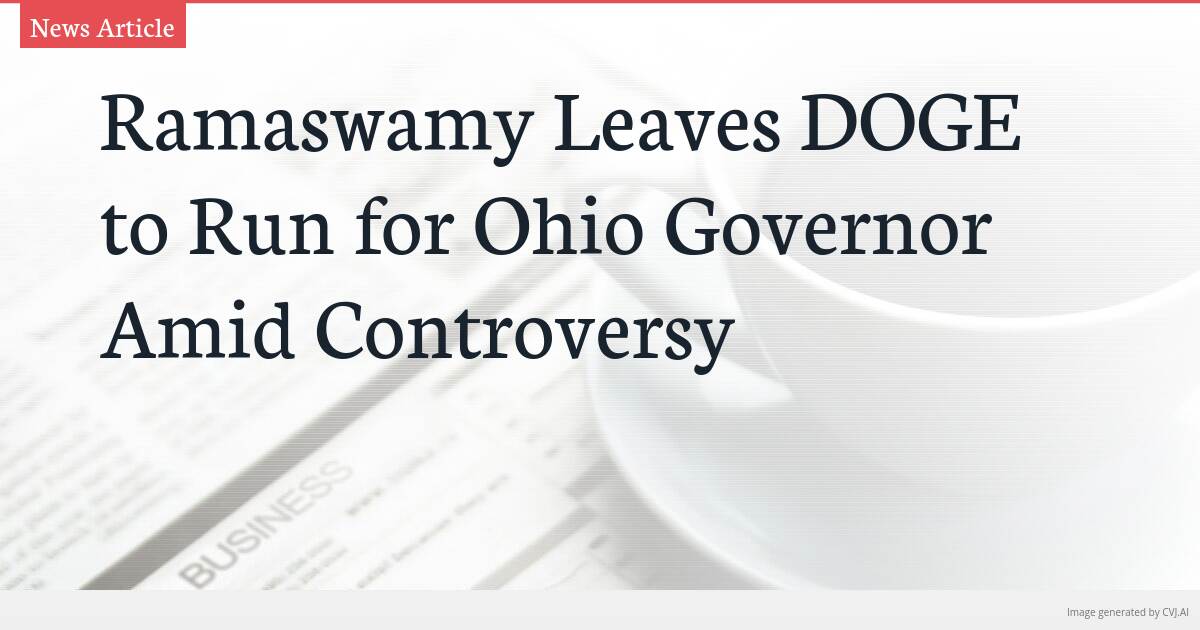This summary text is fully AI-generated and may therefore contain errors or be incomplete.
Vivek Ramaswamy, the entrepreneur and former presidential candidate, has officially stepped down from his role co-leading the Department of Government Efficiency (DOGE) alongside Elon Musk. This decision comes as he aims for a gubernatorial run in Ohio, a move that has garnered significant media attention.
Ramaswamy’s Departure from DOGE
In a recent post on X, Ramaswamy expressed pride in his contributions to the establishment of DOGE, stating, “It was my honor to help support the creation of DOGE.” He conveyed confidence in Musk and the team’s ability to enhance government operations, indicating a smooth transition as he shifts focus to his political ambitions.
Ramaswamy’s gubernatorial bid coincides with the end of Ohio Governor Mike DeWine’s second term, which concludes in January 2027. He has hinted at upcoming details regarding his campaign and reaffirmed his support for former President Donald Trump.
Influence of Organizational Structure
His departure from DOGE was influenced by the organization’s structural requirements, necessitating his exit from the advisory group. Reports suggest that Ramaswamy’s exit was not entirely amicable, with indications that Musk had recently expressed a desire for him to leave DOGE.
A Republican strategist close to Trump’s circle noted that Ramaswamy had “burned through the bridges” with key figures, including Musk. There was a growing sentiment for him to distance himself from both Mar-a-Lago and Washington, D.C.
Cultural Criticism and Economic Issues
This shift follows Ramaswamy’s vocal criticisms of American culture, particularly regarding tech companies’ hiring practices, which he attributed to a mindset favoring mediocrity over excellence. His comments have sparked discussions about the implications of his views on the tech industry and its workforce.
- Concerns about immigration’s impact on American jobs
- Potential resonance with Ohio voters
- Focus on economic issues and job creation
Musk’s Leadership of DOGE
With Ramaswamy’s departure, Musk now leads DOGE independently. The organization, named after the popular cryptocurrency Dogecoin, was established through executive orders signed by Trump on his first day in office, aimed at reducing federal spending through budget cuts and mass firings.
However, DOGE has faced legal challenges, including lawsuits from consumer advocacy groups alleging violations of the Federal Advisory Committee Act. These lawsuits claim that DOGE allows private individuals to influence government decisions without adequate transparency and oversight, raising questions about the legitimacy of its operations.
Ramaswamy’s Gubernatorial Campaign
Ramaswamy’s entry into the Ohio gubernatorial race could significantly alter the state’s political dynamics. His background as a business leader and author positions him as a strong candidate, particularly among Republican voters who prioritize economic growth and innovation.
His alignment with Trump and his outspoken views on cultural issues may galvanize support from the party’s base, which increasingly embraces candidates who challenge the status quo. As the campaign unfolds, Ramaswamy will need to articulate a clear vision for Ohio’s future.
Key Issues for Ohio Voters
Addressing key issues such as job creation, education, and healthcare will be crucial for Ramaswamy. His ability to connect with voters on these topics will be essential in a state that has historically swung between Democratic and Republican leadership.
The upcoming election will not only test Ramaswamy’s political acumen but also reflect broader trends within the Republican Party as it navigates a post-Trump era. All eyes will be on Ramaswamy and his campaign strategy in the months to come.
📎 Read the original article on cointelegraph.com


